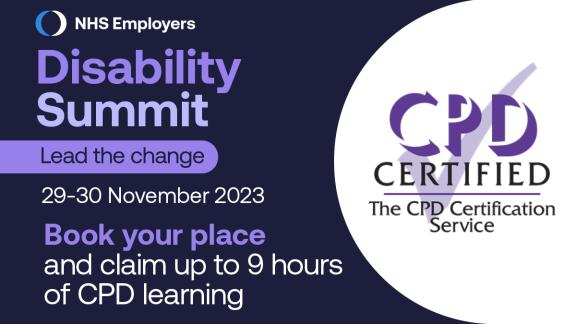These sessions showcased some of the positive work that has taken place and share good practice that can be taken back to your organisation. These sessions were repeated in the morning and afternoon of day two.
We have indicated below which sessions included a British Sign Language (BSL) interpreter.
1. Health and wellbeing (AM BSL)
Health and wellbeing are key aspects of everyday life for disabled people. Often, managing health and wellbeing can be an onerous task for disabled staff, with the perception it is their own responsibility to manage their wellbeing. One result of this is demonstrated in higher levels of presenteeism amongst disabled staff. This session considered how employers can support the long-term health of disabled staff, by seeking to actively support staff with their health and wellbeing.
2. Bullying, harassment and discrimination (AM BSL)
In the 2022 Workforce Disability Equality Standard data, one third of disabled staff reported having experienced bullying, harassment or abused from patients, service users or the public. Around a fifth stated experiencing this from managers and one quarter from colleagues. This is substantially higher than for non-disabled colleagues and indicates an issue that needs to be tackled. This session looked at how creating psychologically safe workspaces, free from discrimination, will benefit everyone.
3. Neurodiversity (AM BSL)
A recent study demonstrated that 77 per cent of autistic doctors had considered suicide, with nearly one quarter attempting it. Only 46 per cent had requested adjustments to be made, and only half of those who requested adjustments had them implemented. Neurodivergent individuals have a varied experience working within the health care setting, with some not defining themselves as disabled. This session looked at how to make the workplace into a safe place, where all staff can thrive and have their needs met.
4. Workplace adjustments (PM BSL)
The 2022 Workforce Disability Equality Standard highlighted that the number of disabled staff reporting they received workplace adjustments to perform their duties has reduced to 72.2 per cent. This means more than a third of disabled staff do not have the adjustments they need to perform their role. These adjustments are a requirement under the Equality Act 2010 and prevent a disabled staff member being placed at a disadvantage. During this session we learnt how suitable adjustments can increase productivity, improve staff health and wellbeing and benefit the organisation and employee alike.
5. How MindView supports neurodivergent individuals in the NHS (PM BSL)
Every individual has unique ways of processing, visualising, and organising information. Recognising and embracing our varied approaches to work and problem-solving is essential.
Our supporter MindView by MatchWare is an advanced mind mapping and project management tool that transforms the way we visualise and handle complex information. While it's beneficial for everyone, those with neurodivergence, such as Dyslexia, Autism or ADHD will find its features especially supportive.
MindView has been selected to feature within several NHS equality, diversity and inclusion improvement plan awards. This session covered the outline of these projects as well as a demonstration of the software.




















